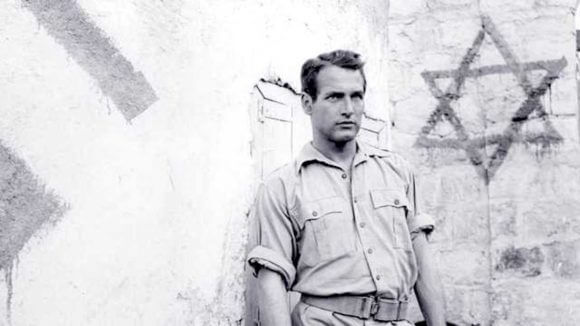OUR AMERICAN ISRAEL
The Story of an Entangled Alliance
by Amy Kaplan
368 pp. Harvard University Press $29.95
The wonderful chapter that Amy Kaplan devotes to Exodus, both the novel and the 1960 Otto Preminger movie, was an eye-opening archaeology of my twelfth year, when I used to read the novel the way I was supposed to read the Bible, but didn’t–every day, and when you get to the end, start over.
I learned, for example, about Uris’s historical distortions; the novel allows the passengers to land safely, while in historical fact the attempt at clandestine immigration was a failure. I learned that Uris put children on the boat, which in fact carried mostly adults, and did so hoping to dislodge the hugely popular image of Anne Frank, which repelled him. I learned that the origin of both the book and the movie lay in Hollywood. MGM vice-president Dore Schary picked Uris for the job. Uris was a Marine vet who had served in the Pacific but knew little about Israel. On the other hand, he had written the screenplay for Gunfight at the O.K. Corral. As Kaplan says, his kibbutz is not a socialist experiment but an American frontier town, and his Zionist pioneer is a stoic American gunfighter who has understood that violence is the only language “they” understand. There were doubtless a lot of Bar Mitzvah speeches in the next years that made versions of the same point.

Commenting on TV series like Homeland and NCIS, movies like Schindler’s List, Munich, and World War Z, and novels like the “Left Behind” series, as well as a rich trove of political speeches and journalism, Our American Israel aims to bring out “the strangeness of an affinity that has come to be seen as self-evident.” At the center of the seemingly unbreakable alliance between the US and Israel, as Kaplan sees it, is a convergence of self-congratulatory mythologies, many of them long familiar to students of American culture: exceptionalism, regeneration through violence, the myth of the frontier, and so on. Kaplan argues that Israel made it possible for Americans to believe things they wanted to believe about themselves but were afraid they couldn’t, like the righteousness of their own use of military violence.
The “myth-based” approach to American identity is a bit out of fashion these days, assuming as it does essential truths that, if you look at the historical record, don’t always turn out to hold. Kaplan’s very careful look at the historical record does not question the myths but creates a fascinating timeline in which shifting American attitudes toward Israel correspond to issues and events that Americans already had on their minds, like the war in Vietnam.
There are nuggets of useful knowledge all over. The Deir Yassin massacre of 1948 was the subject of an indignant letter to the New York Times signed by Albert Einstein and Hannah Arendt. Christian apocalyptic belief in the restoration of the Jews to the Holy Land in fact predates the Zionist movement. “Carter was the first American president to place the Holocaust at the center of America’s commitment to Israel.” Fears presented as eternal were in fact invented, and invented recently. Even Uris’s Exodus “was not haunted by the specter of a new Holocaust.”
Those who know more about this history than I do may be less surprised than I was to discover that in the 1940s, commentators in the mainstream American press “took skeptical or noncommittal stances toward the Zionist movement” while it was the liberals who supported it. It is good to know that so much skepticism existed, some of it pragmatic worry about alienating Arab allies, especially those with oil reserves, but much of it very properly focused on the likely impact of a Jewish state for the Palestinians. It is less good to know that those otherwise known as progressives were responsible for so much of Israel’s support.
Dalton Trumbo, blacklisted under McCarthy but screenwriter of the Exodus film, wrote a note to Preminger about how his script was deliberately distorting history in order to favor the Israeli side. The scene shows a crowd of 20,000 extras in Jerusalem awaiting the results of the UN vote on Partition. Trumbo says he wrote the scene to show the Jews actively desiring Partition, rather than reluctantly accepting it, wheras the truth was that they wanted “the whole land for themselves.” His script, with its emphasis on “their willingness to compromise,” would contrast them favorably with “the unreasonableness of the Arab claims.”
Kaplan takes us back through the self-embarrassments of Zionists like Michael Walzer and Martin Peretz, a Cold-War liberal type that has never gone away and indeed is always ready to raise its righteous voice again in support of the next bit of military adventurism, American or Israeli, on the grounds that our very survival is at stake. If they were capable of shame, this book would shame them. More interesting is the case of I. F. Stone, a progressive brave enough to admit the error of his early Zionism. Writing about the Israel-is-resisting-British-imperialism model, which was purveyed by Walzer (but also previously by Stone himself), and doing so right after the Six-Day War, Stone replied, devastatingly: “the fact that the Jewish community in Palestine afterward fought the British is no more evidence of its not being a colonial implantation than similar wars of British colonists against the mother country, from the American Revolution to Rhodesia” (112).
Too many different collectivities claim to be anti-colonial. It’s a tricky question how to recognize the dizzying and contradictory array of such claims without giving up on the term entirely. Kaplan would clearly have liked to spend more time on the analogy between Israel’s treatment of the Palestinians and America’s treatment of its indigenous peoples, which figures throughout in ways that are both dizzying and infuriating.
The book’s conclusion stresses the paradox that Israelis and Americans have liked to view themselves as both victims and as invincible. But how exceptional is this? It seems possible that all nationalisms draw on a similar paradox. If so–it would certainly seem worth asking– then we would have to look elsewhere to explain the unique intensity and longevity of the US-Israel alliance. Kaplan would have bolstered her case by making some effort to try out alternative explanations. It would have been useful to engage for example with the controversial argument of political scientists Stephen M. Walt and John J. Mearsheimer about the strength of the pro-Israel lobby in the US.
In her chapter on Israel’s invasion of Lebanon in 1982, its bombing of Beirut, and the Sabra and Shatila massacres that followed, Kaplan explains that the tide of American public opinion, at first outraged by the wanton killing of civilians, was turned back in Israel’s favor by its display of self-recrimination: “national soul-searching led to moral rebirth, and self-scrutiny reaffirmed Jewish values” (150). Shooting first and crying afterwards: the phenomenon is well known. But is it possible that the American opinion-makers just needed an excuse, any excuse, to pivot back to Israel? How necessary are the tears, how necessary are arguments as causes, if (as seems possible) the commitment is beyond the reach of arguments? Are cultural perceptions at least highly significant, if not decisive?
Watching US media representations of Israel go up and down since 1945 while the political relationship stays the same, readers may wonder how relevant popular culture and media representation are. Perhaps something else is behind this relationship and is keeping it so firmly in place. This is a moral Kaplan does not seem eager to draw, though if she did it would count as a legitimate and valuable result of her research. And it’s something we need to know.



Re: Leon Uris’s mountain of mendacity, “Exodus,” etc.
“Exodus was not the product of a virgin birth; its origin has been described by a public relations practitioner named Art Stevens in a book called The Persuasion Explosion. He writes that ‘skillful public relations can speed up the acceptance of a concept whose time has come. A striking example of this involved eminent public relations consultant Edward Gottlieb. In the early 1950s, when the newly formed State of Israel was struggling for recognition in the court of world opinion, America was largely apathetic. Gottlieb, who at that time headed his own public relations firm, suddenly had a hunch about how to create a more sympathetic attitude towards Israel. He chose a writer and sent him to Israel with instructions to soak up the atmosphere of the country and create a novel about it. The book turned out to be Exodus by Leon Uris. His novel did more to popularize Israel with the American public than any other single presentation through the media.'” (Art Stevens, The Persuasion Explosion, Washington, D.C; Acropolis Books, 1985, pp. 104-105).
“Stevens notes that unhappily for Uris’s pretensions to objectivity, Uris became carried away by the passion of his own propaganda. He followed Exodus with another book on the Middle East called The Haj, which an Israeli reviewer in the Jerusalem Post described as ‘a raving diatribe against Arabs, their culture and their religion,’ adding that it ‘depicts Arabs in a manner that would make Meir Kahane blush.'”
Source for the above: “The Passionate Attachment: America’s Involvement with Israel, 1947 to the Present,” by George W. Ball, undersecretary of state in the Kennedy and Johnson administrations, US ambassador to the UN, and his son, Douglas, (W. W. Norton and Company, Inc. New York, N.Y., 1992, p. 200 and p. 348.)
“It is less good to know that those otherwise known as progressives were responsible for so much of Israel’s support.”
Those who label themselves progressives and spew hatred directed against Israel are the idiots of today.
I couldn’t find a reference to Trumbo’s note to Preminger. Is it also in George Ball’s book?
“He’s rusty; he can do better than this.”
Some people are ‘useful idiots’ and some people are just idiots.
I realize that the focus here will always be on the propaganda aspects of “Exodus” and I respect that, but for me it was also a movie and a movie experience and I think it was Sal Mineo’s greatest role and don’t tell me about “Rebel Without a Cause” where he plays a nerd, in Exodus he plays a rebel with a cause and that is certainly a much greater fulfillment of Mineo’s potential. The interplay between Paul Newman and Opatashu was great and Lee J. Cobb as Opatashu’s brother was also great. Paul Newman’s character is rather flat compared to all the overacting going on around him. the fact that newman was half Jewish (according to Adam Sandler’s song) only makes the portrayal sweeter. (the interplay between Newman and eva marie saint was quite intriguing and the unknown girl who played mineo’s crush, who looked nonJewish because of her blonde hair, made quite an impression on me as a youth and Karen’s death at the end of Exodus was quite sad. Her shell shocked father also left quite an impression.) To condemn it as propaganda but not to analyze its strengths as fiction or melodrama is to miss half the story. Why was it so effective?